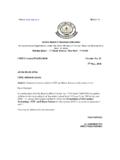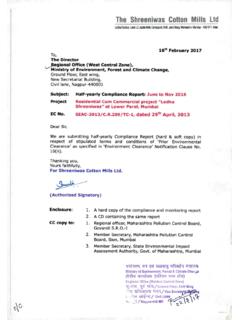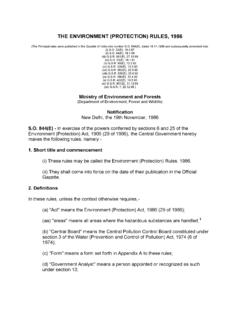Transcription of THE INFORMATION HANDBOOK UNDER - Tamil …
1 TNPCB RTI Act - Manual THE INFORMATION HANDBOOK UNDER THE RIGHT TO INFORMATION ACT, 2005 OBLIGATION OF PUBLIC AUTHORITIES DATE :- TAMILNADU pollution control board 1 TNPCB RTI Act Manual Chapter-1 Introduction INFORMATION pertaining to Right to INFORMATION Act, 2005 Section 4 (1) (b) of the said Act casts an obligation on each public authority to publish a manual on the particulars of its organisation, functions, duties etc. within expiry of 120 days from the enactment of this Act. The manuals on the seventeen items mentioned in the said Act are prepared and enclosed in the chapters to follow.
2 Purpose Creating awareness of the functions, duties and regulations as contemplated in the Environmental Acts which are followed by Tamilnadu pollution control board , to those who abide by them and are concerned about the protection of environment. Intended users Public seeking INFORMATION UNDER the Right to INFORMATION Act, 2005. Organisation Tamilnadu pollution control board . 76, Mount Salai, Guindy, Chennai-600 032 Contact person in order to get INFORMATION Public INFORMATION Officer, Asst. Public INFORMATION Officers, Appellate Authority of Tamilnadu pollution control board .
3 Procedure and fee structure for getting INFORMATION not available in the HANDBOOK Every application for obtaining INFORMATION UNDER The Right to INFORMATION Act, 2005 shall accompany with a fee of Rupees 10/- payable by cash or demand draft or Banker Cheque or Treasury Challan or / by affixing Court Fee Stamp in favour of Tamilnadu pollution control board . TNPCB RTI Act Manual Chapter-2 (Manual-1) Particulars of its organization, functions and duties Purpose of the public authority: The Tamil Nadu Prevention and control of Water pollution board was constituted by the Government of Tamilnadu on twenty seventh day of February, Nineteen eighty two in pursuance of the Water (Prevention and control of pollution ) Act, 1974(Central Act 6 of 1974) and Air (P&CP)Act, 1981.
4 The board was later renamed as Tamil Nadu pollution control board (TNPCB) in the year board has been playing a catalytic role in implementing environmental policies, law regulations and developing frameworks to manage both wastes and natural resources more efficiently. Vision Statement of the Public authority: The environment where we live and the eco-system of which we are a part, are too susceptible that their finite resources cannot be over-exploited. Ensure preservation, protection and improvement of the environment, for present and future generations Brief history of the TNPCB: The Tamilnadu pollution control board is having its Head Office at Chennai.
5 The board covers the entire State through its 36 District Offices at the Districts of Tamilnadu in Chennai, Thiruvallvur, Ambattur, A r i y a l u r , Sriperumpudur @ Padappai, Maraimalai Nagar (Part of Kancheepuram District), Vellore, Vaniyambadi, Hosur, Salem, Namakkal, Erode, Perundurai, Coimbatore North, Coimbatore South, Cuddalore, Tiruppur North, Tiruppur South, Thanjavur, Trichy, Karur, Dindigul, Madurai, Virudhunagar, Thoothukudi, Tirunelveli, Villupuram, Nagapattinam, Pudukkottai, Nagarcoil, Udhagamandalam, Thiruvannamalai, Theni, Sivagangai, Dharmapuri, Ramanadhapuram each headed by either a DEE or AEE.
6 The board has established Advanced Environmental Laboratories at Chennai, Coimbatore, Cuddalore, Madurai and Salem and District Environmental Laboratories at Ambattur, Dindigul, Manali, Vellore, Hosur, Tiruppur,Trichy, Maraimalai Nagar, Tirunelveli, Thoothukudi each headed by Additional Manager (Lab)/Deputy Manager (Lab). TNPCB RTI Act Manual Complaint Cell Due to the increased environmental awareness and awareness on pollution control Legislations, several complaints are being received from various individuals / organisation / NGOs etc.
7 , regarding water, air, noise and vehicular pollution . To take appropriate action against these complaints, an active Complaint cell is functioning in the head office, Chennai. For easy access of the public and others, a separate telephone number 22353153 is allotted for receiving complaints and guidance. The complaints are attended by calling reports along with the recommendations from the field officers of the board . Action as required based on the reports have been taken then and there. Address of the Corporate office and District Offices Corporate Office address: 76, Mount Salai, Guindy, Chennai 600032 Working hours of the Office: AM to PM on all working days as per Government Rules.
8 Details of addresses of District Offices are enclosed in Annexure II Functions of the TNPCB: The Tamilnadu pollution control board is empowered to carry out its functions UNDER the provisions of the following Environmental Acts and Amendments issued there UNDER . 1) The Water (Prevention & control of pollution ) Act, 1974 and its amendments Objectives: The objectives of the Water (Prevention and control of pollution ) Act are to provide for the Prevention and control of pollution and the maintenance or restoration of the wholesomeness of water for the establishment, with a view to carrying out the purposes aforesaid, of Boards for the prevention and control of water pollution , for conferring on and assigning to such Boards powers and functions relating thereto and for matters connected therewith.
9 Functions: (1) Subject to the provisions of the Section 17 of this Act, the functions of a State board shall be: (a) To plan a comprehensive programme for the prevention, control or abatement of pollution of streams and wells in the State and to secure the execution thereof (b) To advise the State Government on any matter concerning the prevention, control or abatement of water pollution (c) To collect and disseminate INFORMATION relating to water pollution and the prevention, control of abatement thereof (d) To encourage, conduct and participate in investigations and research relating to problems of water pollution and prevention, control or abatement of water pollution (e) To collaborate with the Central board in organising the training of persons engaged or to be engaged in programmes relating to prevention, control or abatement of water pollution and to organise mass education programmes relating thereto TNPCB RTI Act Manual (f)
10 To inspect sewage or trade effluents, works and plants for the treatment of sewage and trade effluents and to review plans, specifications or other data relating to plants setup for the treatment of water, works for the purification thereof and the system for the disposal of sewage or trade effluents or in connection with the grant of any consent as required by this Act (g) To lay down, modify or annul effluent standards for the sewage and trade effluents and for the quality or receiving waters (not being water in an inter-State stream) resulting from the discharge of effluents and to classify waters of the State (h) To evolve economical and reliable methods of treatment of sewage and trade effluents, having regard to the peculiar conditions of soils, climate and water resources of different regions and more especially the prevailing flow characteristics of water in streams and wells which render it impossible to attain even the minimum degree of dilution (i) To evolve methods of utilisation of sewage and suitable trade effluents in agriculture.





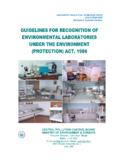
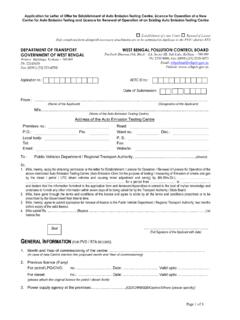
![1[SCHEDULE VI] - Welcome to Central Pollution …](/cache/preview/d/6/4/6/4/2/4/9/thumb-d6464249d79972a2e804a0aa4573c697.jpg)
